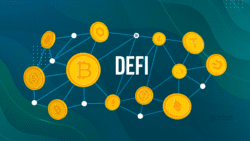The Role Of Blockchain In The Fintech Industry
The financial technology (fintech) industry is profoundly transformed by technological advancements. Among the various technologies reshaping the fintech landscape, blockchain stands out as a game-changer. Blockchain technology, originally designed to support cryptocurrencies like Bitcoin, has found numerous applications beyond cryptocurrency, particularly within the fintech sector. Its ability to enhance security, transparency, efficiency, and trust has positioned it as a fundamental innovation in modern finance. Let’s explore the role of blockchain in the fintech industry in greater detail.
1. Enhanced Security and Transparency: One of the key challenges in financial transactions is ensuring security and transparency. Blockchain’s distributed and immutable ledger offers an innovative solution. In traditional financial systems, data is often stored in centralized databases vulnerable to cyberattacks. In contrast, blockchain’s decentralized nature makes it extremely difficult for malicious actors to alter transaction records. Every transaction is recorded in a block, linked in chronological order, forming an unbreakable chain. This transparency reduces the risk of fraud and enhances the security of financial transactions.
2. Streamlined Cross-Border Payments: Cross-border payments are often complex, involving intermediaries, delays, and high fees. Blockchain technology can simplify this process by enabling real-time peer-to-peer transactions without the need for intermediaries. By utilizing cryptocurrencies or tokenized assets, international transfers can become faster, cheaper, and more efficient, benefiting both individuals and businesses engaged in global trade.
3. Smart Contracts for Automation: Smart contracts are self-executing contracts with the terms directly written into code. Blockchain facilitates the deployment of smart contracts, which automatically execute actions when predefined conditions are met. In the fintech industry, these contracts can automate processes such as loan approvals, insurance claims, and supply chain financing. This reduces administrative overhead, minimizes human error, and accelerates transaction settlement.
4. Tokenization of Assets: Blockchain enables the digitization and tokenization of real-world assets like real estate, stocks, bonds, and commodities. This process converts traditionally illiquid assets into easily tradable tokens. These tokens can be bought, sold, and traded with greater efficiency, enabling broader accessibility to investment opportunities and enhancing liquidity in markets.
5. Improved Identity Verification: Identity verification is a critical aspect of financial services. Blockchain’s secure and decentralized nature can enhance identity verification processes. Users can maintain control over their data, sharing only the necessary information for transactions without exposing sensitive details. This not only reduces the risk of identity theft but also accelerates customer onboarding processes.
6. Decentralized Finance (DeFi): DeFi is a rapidly growing sector within fintech that leverages blockchain to recreate traditional financial services in a decentralized manner. DeFi platforms offer services like lending, borrowing, trading, and yield farming directly on the blockchain. By eliminating intermediaries, DeFi provides users with greater control over their finances and often offers more competitive rates compared to traditional financial institutions.
7. Regulatory Compliance and Auditing: Blockchain’s transparent and tamper-resistant nature is valuable for regulatory compliance and auditing. All transactions are recorded in a verifiable manner, making it easier for regulators and auditors to verify the accuracy of financial data. This can streamline the regulatory reporting process and reduce the chances of non-compliance.
Blockchain technology is reshaping the fintech industry by introducing security, transparency, efficiency, and automation to financial processes. As the technology continues to evolve, its impact on fintech will likely expand, enabling new business models, improving customer experiences, and driving innovation in financial services. As fintech companies embrace blockchain, they stand to gain a competitive edge in a rapidly changing landscape.
$QNT Chief Product Officer Martin Hargreaves talking to The Fintech Times about the importance of #Blockchain collaboration $QNT OverLedger will be used in every Digital sector going not just Finance
The Future is Quant#Bitcoin #eth #QNT #Crypto pic.twitter.com/GN1d5nWBpV
— ConstructionTrader.eth (@C_Traderz) August 20, 2023
Transformative Impact of Blockchain on the Fintech Industry
Here are the transformative impacts of blockchain on the fintech industry:
- Immutable Audit Trails: Blockchain’s permanent and unchangeable records create robust audit trails. Financial institutions can track and verify transactions seamlessly, ensuring compliance with regulations and reducing the need for extensive manual record-keeping.
- Reduced Fraud and Identity Theft: Blockchain’s security features and cryptographic protocols help mitigate fraud and identity theft. Verified transactions are securely stored, preventing unauthorized access and protecting sensitive customer information.
- Global Financial Inclusion: Blockchain lowers barriers to entry for financial services, enabling individuals in underserved regions to access banking, loans, and investments. This contributes to global financial inclusion and empowers previously excluded populations.
- Enhanced Credit Scoring: Blockchain’s transparent transaction history can be used to create more accurate credit scoring models. This benefits individuals with limited credit histories and allows lenders to make more informed lending decisions.
- Simplified KYC and AML Compliance: Know Your Customer (KYC) and Anti-Money Laundering (AML) procedures can be streamlined through blockchain-based identity verification. Users’ verified identities can be securely shared across financial institutions, reducing redundancy and improving compliance.
- Real-Time Settlements: Traditional financial systems often involve delays in settlements due to intermediary processes. Blockchain enables real-time settlements by automating transaction verification and reducing the need for intermediaries.
- Fraud Detection and Prevention: Blockchain’s transparent and traceable nature aids in fraud detection and prevention. Suspicious transactions can be quickly identified and investigated, reducing the risk of fraudulent activities.
- Data Ownership and Monetization: Blockchain allows individuals to control and monetize their own data. This gives consumers more agency over their personal information and the option to profit from sharing it with trusted parties.
- Smart Identity Solutions: Blockchain can create secure digital identities that users can manage themselves. This reduces the risk of identity theft, as users have control over who accesses their identity information.
- Digital Marketplaces and Tokenized Assets: Blockchain facilitates the creation of digital marketplaces for trading various assets, from artwork to intellectual property. These platforms enable fractional ownership, unlocking new investment opportunities.
The transformative impact of blockchain on the fintech industry is extensive, ranging from improved security and transparency to enabling new business models and empowering previously underserved populations. As fintech continues to evolve, blockchain’s innovative solutions are poised to reshape the financial landscape by addressing longstanding challenges and ushering in a new era of efficiency and inclusivity.
While working directly with #fintech companies on a daily basis, I do notice a clear trend – #blockchain projects scale much faster, as long as the employed strategies bring significant APY increase (in our case, we’ve offering continous 19.7% APY).
To boostrap a payment…
— Viktor Vostrikov (@viktor_vost) August 20, 2023
Challenges in the uses of blockchain for fintech:
- Scalability Issues: Blockchain networks, particularly those using proof-of-work consensus mechanisms, often struggle with scalability. As the number of transactions increases, the network can become slow and congested, leading to delays and high transaction fees. This is a significant challenge for fintech applications that require high throughput and fast processing.
- Regulatory Uncertainty: The regulatory landscape for blockchain and cryptocurrencies is still evolving. Fintech companies using blockchain need to navigate complex and potentially conflicting regulations across different jurisdictions. This uncertainty can slow down innovation and investment in blockchain-based fintech solutions.
- Interoperability: Different blockchain platforms may not easily communicate with each other, creating interoperability challenges. In the fintech sector, where cross-platform integration is crucial, this lack of interoperability can hinder seamless data sharing and collaboration.
- Data Privacy and Security: While blockchain enhances security for transactions, it poses challenges related to data privacy. Sensitive financial data may be stored on a public or private blockchain, raising concerns about compliance with data protection regulations and the exposure of sensitive information to unauthorized parties.
- Energy Consumption: Many blockchain networks, especially those using proof-of-work, require substantial energy resources to operate. This environmental concern clashes with the growing demand for sustainable and eco-friendly technologies in the fintech industry.
- User Experience and Complexity: Blockchain-based systems can be complex for average users, impacting the user experience. Wallet management, private key security, and transaction confirmation times can be daunting for newcomers, potentially slowing the adoption of blockchain-based fintech solutions.
- Lack of Talent and Expertise: Blockchain technology is relatively new and requires specialized skills and expertise to develop and implement effectively. Finding skilled blockchain developers and experts in the fintech industry can be challenging, potentially leading to project delays and increased costs.
- Volatility of Cryptocurrencies: Cryptocurrencies, often used in blockchain-based fintech applications, are known for their price volatility. This poses challenges for businesses looking to transact in cryptocurrencies, manage risk, and ensure the stability of their financial operations.
- Consensus Mechanism Selection: Choosing the appropriate consensus mechanism for a blockchain-based fintech application is crucial. Different mechanisms have varying levels of security, scalability, and energy efficiency. Selecting the wrong mechanism can impact the overall performance of the system.
- Legacy System Integration: Integrating blockchain solutions with existing legacy systems can be complex and time-consuming. Fintech companies may need to redesign or adapt their existing infrastructure to work harmoniously with blockchain technology, potentially disrupting ongoing operations.
Also, read – Top 10 FinTech Startups That Leverage Technology And Innovation In 2023
Blockchain holds immense potential for transforming the fintech industry, there are significant challenges that need to be addressed. These challenges range from technical issues like scalability and interoperability to regulatory uncertainties and user experience concerns. Successfully navigating these challenges will require collaboration, innovation, and a deep understanding of both blockchain technology and the unique demands of the fintech sector.
Stay informed with daily updates from Blockchain Magazine on Google News. Click here to follow us and mark as favorite: [Blockchain Magazine on Google News].
Get Blockchain Insights In Inbox
Stay ahead of the curve with expert analysis and market updates.
latest from tech
Disclaimer: Any post shared by a third-party agency are sponsored and Blockchain Magazine has no views on any such posts. The views and opinions expressed in this post are those of the clients and do not necessarily reflect the official policy or position of Blockchain Magazine. The information provided in this post is for informational purposes only and should not be considered as financial, investment, or professional advice. Blockchain Magazine does not endorse or promote any specific products, services, or companies mentioned in this posts. Readers are encouraged to conduct their own research and consult with a qualified professional before making any financial decisions. The featured image used is just a creative depiction of the title and it does not intend to hurt sentiments of any person or institution. If it hurts anyone sentiments, please do not hesitate to reach out to Blockchain Magazine.

 Bitcoin
Bitcoin  Ethereum
Ethereum  XRP
XRP  Tether
Tether  Solana
Solana  USDC
USDC  Dogecoin
Dogecoin  Cardano
Cardano  Lido Staked Ether
Lido Staked Ether  TRON
TRON  Wrapped Bitcoin
Wrapped Bitcoin  Chainlink
Chainlink  Wrapped stETH
Wrapped stETH  Sui
Sui  Avalanche
Avalanche  Stellar
Stellar  Shiba Inu
Shiba Inu  Hedera
Hedera  Toncoin
Toncoin  LEO Token
LEO Token  Hyperliquid
Hyperliquid  Bitget Token
Bitget Token  Litecoin
Litecoin  WETH
WETH  USDS
USDS  Polkadot
Polkadot  Bitcoin Cash
Bitcoin Cash  Ethena USDe
Ethena USDe  Wrapped eETH
Wrapped eETH  MANTRA
MANTRA  Uniswap
Uniswap  Pepe
Pepe  Ondo
Ondo  Monero
Monero  Aave
Aave  NEAR Protocol
NEAR Protocol  WhiteBIT Coin
WhiteBIT Coin  Mantle
Mantle  Official Trump
Official Trump  Aptos
Aptos  Dai
Dai  Internet Computer
Internet Computer  Ethereum Classic
Ethereum Classic  Bittensor
Bittensor  Cronos
Cronos  OKB
OKB  POL (ex-MATIC)
POL (ex-MATIC)  Gate
Gate 







